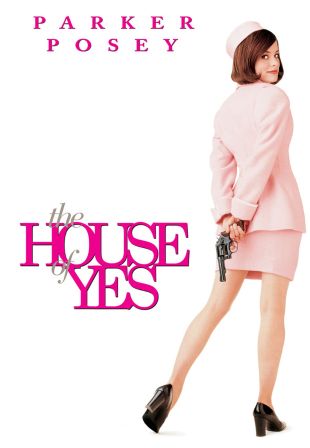Although its arch banter occasionally falls flat and its claustrophobic production design leaves things a little bit stagebound, this adaptation of playwright Wendy MacLeod's +The House of Yes works because of its richly layered script, its frequently hilarious dialogue, and its fine, if unexpected, casting decisions. In his feature debut, writer/director Mark S. Waters displays a deft hand with both brittle comedy and sharp psychological drama as he depicts the emotional and spiritual carnage of the decaying East Coast political gentry. Some audiences mistook the taboo-breaking plot as nothing more than indie titillation, but MacLeod's source material draws on the dramatic lineage of Noel Coward, Harold Pinter, Joe Orton, and Oscar Wilde -- not to mention The Rocky Horror Picture Show -- as it dissects an upper-crust dynasty's disaffection and permissiveness (check the title). The Pascal family belongs to the lower rungs of the Washington, D.C., social establishment, but its members proclaim their disdain for bourgeois values in deliciously tart aphorisms and epigrams. Indie darling Parker Posey plays the showiest role and therefore garnered the most critical attention, but it's actually Tori Spelling and Freddie Prinze Jr. whose performances prove the most surprising. Shrugging off their substance-free images, both young actors exercise subtlety and precision as their characters -- a wholesome "donut queen" and the kid brother of a pair of incestuous fraternal twins -- provide the vox populi to Posey and Genevieve Bujold's haughty entitlement. In a role that echoes Katharine Hepburn's in Suddenly Last Summer, Bujold is the epitome of regal wit and matriarchal ennui, but mention must be made of Josh Hamilton's equally dextrous prodigal son. The plot hinges on Marty's desire to escape his family's House of Usher-like degeneration, which makes it all the more wickedly pleasurable to watch him slide into old habits the minute he's exposed to the seductive familiarity of his twisted clan. Posey sometimes plays the spoiled, skewed Jackie-O a bit too broadly, but the minute Hamilton joins her onscreen, their characters start completing one another's sentences as only real-life twins (and lovers) truly could. In magnifying the maddeningly inextricable pull of the familial bond, House of Yes touches on truths more universal than its privileged setting might suggest.

The House of Yes (1997)
Directed by Mark Waters
Genres - Drama, Comedy |
Sub-Genres - Black Comedy, Sex Comedy |
Release Date - Oct 10, 1997 (USA - Limited), Oct 10, 1997 (USA) |
Run Time - 85 min. |
Countries - United States |
MPAA Rating - R
Share on